#character development analysis
Explore tagged Tumblr posts
Text
Fun fact: if you buy the Kirby anime blu-ray, you will also receive a special booklet that tells you information about the anime showing summaries and concept art from each episode
If you want to check it out here’s the link:
https://archive.org/details/kirby-of-the-stars-anime-bluray-box-special-booklet/page/n4/mode/1up?view=theater
As much as I love this booklet, I have one major issue with it…
Look at this image for a second and tell me if there is something wrong with it:


If you answered Knuckle Joe being in this category, then you are correct 🎉🎉
I seriously love this book so much, but Knuckle Joe being in this category feels so wrong. I often wonder if the person who made this book watched ALL of the episodes he was featured in. In the episode “Here Comes The Son” he wants to get revenge on the Star Warrior who is responsible for killing his dad. After hearing the truth, Joe doesn’t know how to react so he relies on anger as a way to respond to Meta Knight’s story. Unfortunately Joe doesn’t know that his unhealthy coping mechanism would later turn him into a monster. Knuckle Joe’s way of coping from the loss of his father a mix of anger, hatred, and vengeance and if not checked on, can lead him to lose control of himself. During the battle with Kirby, Joe is very focused on his anger that transforms him into a needle monster, scaring him for life. If Knuckle Joe only appeared in that episode, I can see him being in this category, but since he appears in multiple episodes where his character grows, it doesn’t feel necessary to add him here. After transforming back into his regular self, Joe would later reform and focus on justice rather than vengeance. As a way to redeem himself, he becomes a Monster Hunter in order to destroy as many monsters as possible, most notably Masher (also known as Masher 2.0 in a later episode). “Monster Management” is an Episode that has SOME flaws, but it’s also the episode that grows Knuckle Joe into a better person and willing to become a hero (if your curious about the flaws I pointed out about the episode, check out my 4KIDS rant I made a while back). It’s honestly impressive that a child/teen was able to think of all of these plans in order to outsmart an entire corporation. Even though his plan wasn’t really that well executed in the show (makes sense for his age), he succeeds his mission by manipulating the sales guy by sending one of the strongest monsters, just for Joe to later defeat the monster with the help from Kirby. Meta Knight notes how impressed he is to Joe’s growth that he even says this to him:
(Episode: Monster Management (JAPANESE VER))
“Have you chosen the same path as your father, to defeat demon beasts?”-Meta Knight
Also in the same scene, Knuckle Joe wants to help his friends in case they are in danger, so he tells Kirby, if there’s something bothering him, Joe is always eager to help:
(Episode: Monster Management (JAPANESE VER))
“You can always call on me if anything happens. I’ll come as soon as I can.”-Knuckle Joe
These lines also prove that Knuckle Joe isn’t hunting down these monsters for himself, but is actually hunting down monsters to save the people around him. You know another person who hunted down monsters for the sake of the universe? It was Knuckle Joe’s Father, Jecra. He was literally a Star Warrior who risked his life in an attempt to stop the war eNeMeE made, even if it ended up with him getting kidnapped by a monster. Knuckle Joe is not a selfish brat, but is a heroic fighter who would be willing to follow his father’s footsteps and become a better person.
Knuckle Joe is strong, smart and determined and would do anything to protect the people he loves. LITERALLY IN THE BEGINNING OF “MASHER 2.0” YOU LITERALLY SEE HIM HUNTING DOWN MONSTERS DESPITE THE FACT THAT HE IS PUTTING HIS LIFE AT RISK TO PROTECT WHATEVER THAT BLOODY ORANGE PLANET IS (probably his planet filled with people that he is fond of (I also heavily checking out my lore dump about that scene))! WHAT IS EVEN THE POINT OF ADDING SOMEONE WHO IS LITERALLY HUNTING DOWN MONSTERS IN A MONSTER CATEGORY!?!?! IT LITERALLY MAKES NO SENSE!!!!! EVEN AFTER HE WAKES UP AND TELLS TIFF ABOUT MASHER, HE DOESNT CARE ABOUT HIS INJURIES AND WANTS TO DEFEAT MASHER SO HIS FRIENDS WOULD’NT BE IN DANGER!!!! NO MATTER IF MASHER WAS UPGRADED OR NOT, KNUCKLE JOE WANTED TO DESTROY THE MONSTER FOR GOOD INTENTIONS, NOT JUST FOR HIMSELF!!!!!
Also did the publisher forget that in the movie, Knuckle Joe is one of the three rouge destroya pilots? He literally became a pilot, so that he could help Kirby and his friends defeat eNeMeE (which Kirby SUCCEEDED). If Knuckle Joe didn’t reform himself, the war with the GSA members and the monsters would’ve continued. THATS HOW IMPORTANT JOE, SIRICA, AND ARTHUR ARE!!!! If it wasn’t for them, the Halberd would’ve never made it to eNeMeE territory. The pilots couldn’t destroy all of the bad Destroya ships, so Joe warns Meta Knight that three Destroya ships are after the Halberd and they should look out.
(Episode: Fright to the finish)
"I hate to tell ya this, Meta Knight, but I got some bad news for ya! Three Destroyas got through. They're headed your way!"- Knuckle Joe
Near the end of the same episode when Kirby and his friends escape from the fortress, Knuckle Joe is concerned for them and says this:
(Episode: Fright to the finish)
“I hope they all had time to…get away!”-Knuckle Joe
If Knuckle Joe wasn’t a good guy, he would’ve had no worry for Kirby and his friends to return. Not only should we celebrate Kirby, Tiff and the Halberd crew for stopping the war, but we should also appreciate each of the rouge destroya pilots for helping them enter the fortress.
Another thing I don’t get at all is that the description describes Joe as someone who is plotting to destroy the universe. HE LITERALLY DID THE OPPOSITE OF THAT BY SAVING THE UNIVERSE!!!! The only monstrous thing he has done is avenging his father, NOT PLOTTING TO CONTROL THE UNIVERSE!!!!
WAS IT THAT HARD TO PUT HIM IN THIS CATEGORY INSTEAD!?!

(IGNORE HOW MY TRANSLATOR MISTRANSLATED FUMU AND BUN’S NAMES)

Okay, he isn’t always with Kirby, but he is still a good friend to him. They should’ve also made a side character category and he would be included alongside some guest stars. Or a Star Warrior category where not only the book gives us information about the Star Warriors themselves but also the people who are related to them.
Also another error that I noticed in this book is that they used his normal colors instead of his monstrous colors.
IF YOU ARE GOING TO LIST KNUCKLE JOE AS A MONSTER USE THESE RENDERS:


NOT THIS:

If you want to make an official source for your characters, you should fully understand them before you decide what category they belong to. Knuckle Joe did start as a vengeful person, but he ends up becoming a very important hero to not only Kirby and his friends, but also the universe. His character is clearly written to show how a person can change after a traumatic experience. Imagine how traumatizing it would be to transform into a needle monster, his transformation makes him realize he is doing something wrong and that he should change. Since he is a kid, he might not realize that doing some of these things are wrong, but still has the time to learn and improve himself. Nobody is perfect, people have flaws and it’s best for them to learn from them. He has learned from his mistakes which ended up changing who he is for the better. Seeing the writers throw away his character development like that is just disgusting, especially since it’s the main point of his character. If it wasn’t for Joe and the other rouge pilots, the Halberd would’ve been destroyed and Kirby would never gain peace to the universe.
EXTRA:
Basically my rant in a nutshell

#hoshi no kaabii#kirby right back at ya#kirby of the stars#knuckle joe#character analysis#mischaracterization rant#character development analysis#Kirby anime booklet#character rant#meme#star warrior kirby#kirby gsa
4 notes
·
View notes
Text
List of 40 character flaws
Stubbornness, Unyielding in one's own views, even when wrong.
Impatience, Difficulty waiting for long-term results.
Self-doubt, Constant uncertainty despite evident abilities.
Quick temper, Excessive reactions to provocations.
Selfishness, Prioritizing one's own needs over others'.
Arrogance, Overestimating one's own abilities.
Trust issues, Difficulty trusting others.
Perfectionism, Setting unreachable high standards.
Fear of change, Avoiding changes.
Haunted by the past, Old mistakes or traumas influencing the present.
Jealousy, Envious of others' successes.
Laziness, Hesitant to exert effort.
Vindictiveness, Strong desire for revenge.
Prejudice, Unfair biases against others.
Shyness, Excessive timidity.
Indecisiveness, Difficulty making decisions.
Vulnerability, Overly sensitive to criticism.
Greed, Strong desire for more (money, power, etc.).
Dishonesty, Tendency to distort the truth.
Recklessness, Ignoring the consequences of one's actions.
Cynicism, Negative attitude and distrust.
Cowardice, Lack of courage in critical moments.
Hotheadedness, Quick, often thoughtless reactions.
Contentiousness, Tendency to provoke conflicts.
Forgetfulness, Difficulty remembering important details.
Kleptomania, Compulsion to steal things.
Hypochondria, Excessive concern about one's health.
Pessimism, Expecting the worst in every situation.
Narcissism, Excessive self-love.
Control freak, Inability to let go or trust others.
Tactlessness, Inability to address sensitive topics sensitively.
Hopelessness, Feeling that nothing will get better.
Dogmatism, Rigidity in one's own beliefs.
Unreliability, Inability to keep promises.
Closed-offness, Difficulty expressing emotions.
Impulsiveness, Acting without thinking.
Wounded pride, Overly sensitive to criticism of oneself.
Isolation, Tendency to withdraw from others.
#writing#writer on tumblr#writerscommunity#writing tips#character development#writing advice#oc character#writing help#creative writing#character flaws#flaws#character analysis
12K notes
·
View notes
Text
I’ve only seen it once so forgive me for not saying more—
—but my favorite sequence is by far the part where ROZ is watching Brightbill finally take flight, and she looks up to try and see him as he gets farther away, but then her view of Brightbill is blocked by the pop-up screen saying “Task Complete.”
And she has to rush after him to get her final look, because of that. Because the Task was getting in the way of her seeing him.

#the wild robot#Roz#Fink#fink the fox#lupita nyong'o#chris sanders#pedro pascal#dreamworks#Brightbill#animation#animated movie#2024 movies#analysis#the anatomy of a scene#narrative#storytelling#visual storytelling#storyboarding#character development
2K notes
·
View notes
Text
"Nothing Jason says can be taken for truth."

"I believe you."

#dc#dc comics#comics#comic books#battle for the cowl#bftc#nightwing annual#nightwing comics#batkids#batfam#batfamily#character dynamics#character development#dick grayson#nightwing#jason todd#red hood#batbros#bat brothers#batsiblings#found family#bat family#comic characters#batman characters#comic pages#comic panels#media analysis#comic analysis#character analysis#character dialogue
1K notes
·
View notes
Text
I love to see Loid's protective side towards Yor growing at a steady pace.
Loid has always been so protective towards Yor from the beginning, even before he himself was aware.
As shown at chp. 5
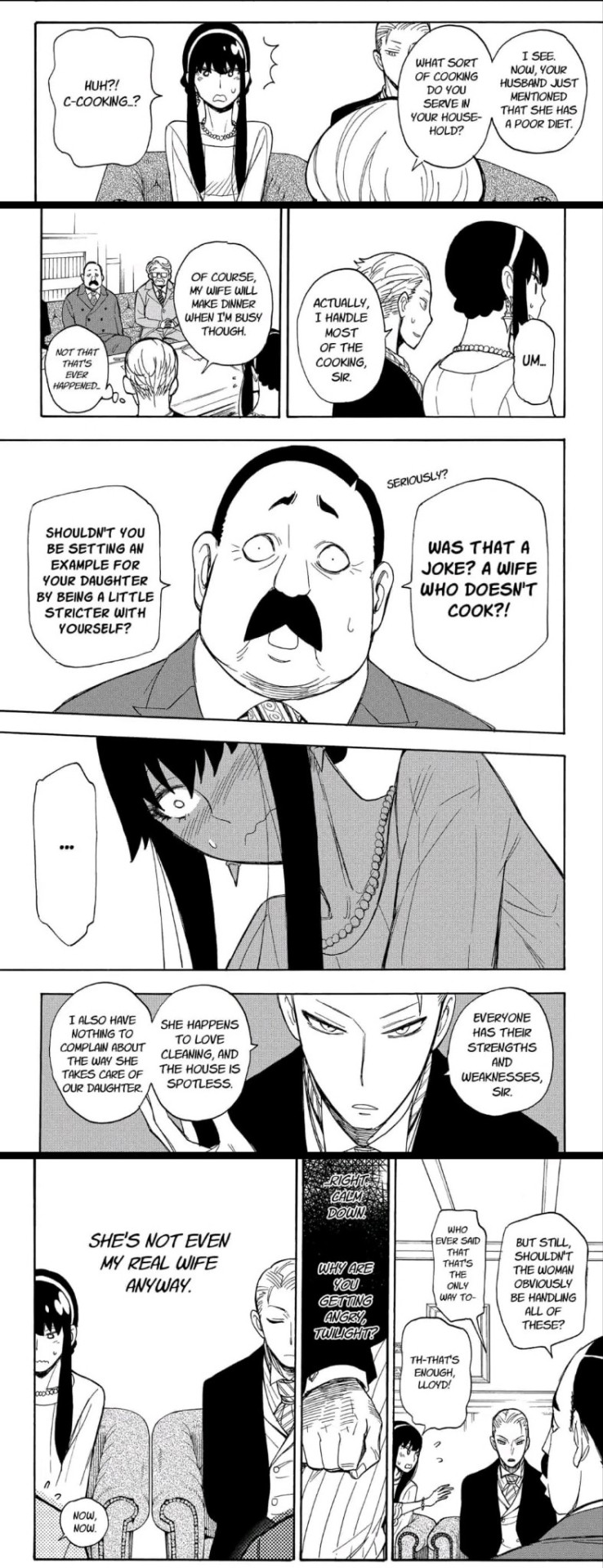
Here, he has just met Yor, but the moment Swan dared to stomp on her feelings, he got agitated and defend her right away. Even though, he still able to stop himself, and rationalize things.
It happened again during chp. 30

Look at how fast Loid's expression changed from "Hey, what are you doing here, Fiona?" Into "I dare you to say another word about Yor (grrrr)", at the exact moment Fiona dare to imply how worthless Yor was.
Still, after this time, once again Loid rationalized all of actions are for mere mission sake, even though we know during later chapter that he dislike the disguise that imply he and Fiona were married couple.
During Wheeler arc, at chp. 86, Loid finally aware about his "weakness". And that weakness is someone named Yor.
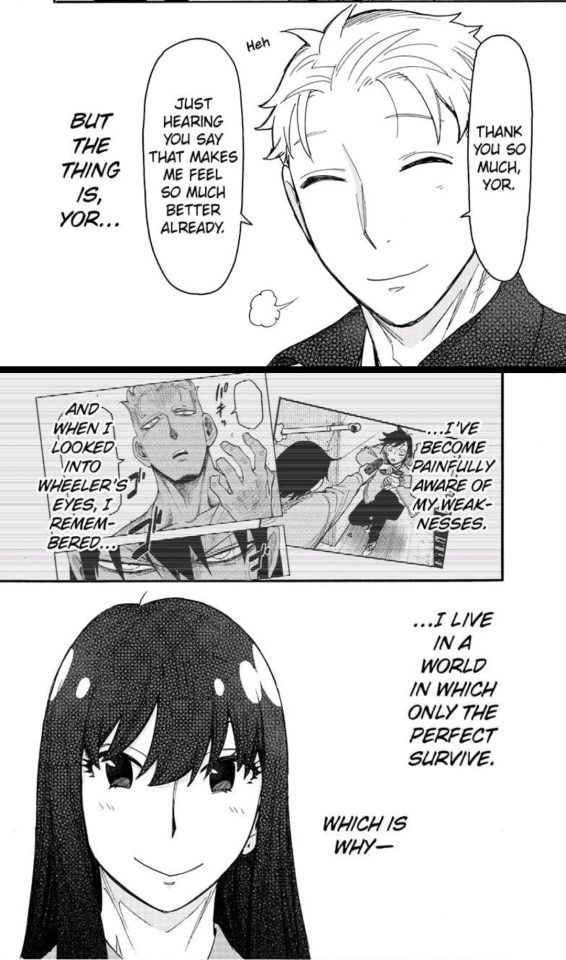
(smh. 🙄🙄 This man really is slow in learning about feelings. But he is getting there......)
Nevertheless, this realization really evoke his protective side. And almost immediately after this moment, he started to actively move to protect Yor, even in the slightest sign of possible 'attack'.
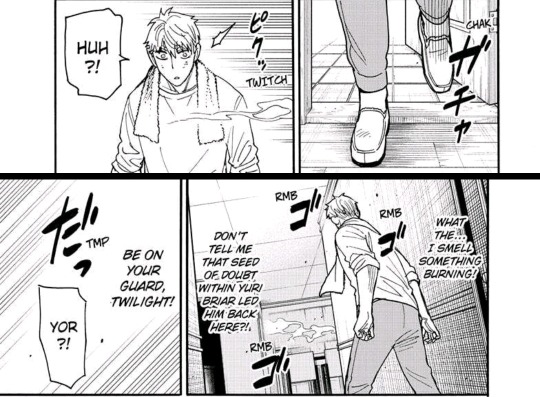
At the latest chapter, chp. 94, a.k.a only in 6 chapters later, he even starts to actively use his physical power to prevent even the slightest discomfort to happen towards Yor.

Look at how hard Loid gripped that man's arm for daring to suggest tying Yor up. And that glare??? Geeezzzz.....
Now, I have a desperate need to see Loid going full attack towards someone who dares to hurt Yor either pysiologically or (is it possible?) physically in somekind of situation like maybe something like (shameless self promotion here) my fic.
Please Endoooooo, I'm begging you..... 🙏🙏
Give us more protective and jealous Loid.
I need to see it 😫😫😫😫😫
#spy x family#loid forger#yor forger#twiyor#sxf character development#sxf character analysis#sxf manga#sxf manga spoilers#sxf speculation#sxf theory#i live to see protective Loid#pleaseeeee
2K notes
·
View notes
Text
Something I love about Mob Psycho is that Reigen is a fraud, but not in the way you'd originally think. He still helps people, just not in the way they think he's helping them. Any non spiritual problems he can solve for his clients, he will, and he even makes a point not to take money he feels like he didn't earn.
This applies to his mentorship with Mob; although, yes, he's using Mob's powers to his own personal gain, his original promise to help Mob learn to control his powers is still fulfilled. Mob's powers are directly tied to his emotions; and we can see that clearly throughout the series. Regulation of Mob's emotions in turn regulates his powers. Reigen's guidance is a large part of that regulation. The lessons he instills in Mob (don't use your powers on other people, your powers are just a trait and they don't make you inherently worth more or entitled to more than anyone else, and several others he learns from Reigen over the course of the series) are a huge part in putting Mob on the right path in regards to the use of his powers. It shapes his mindset and strong morals surrounding them, and this mindset shapes his emotions and power regulation. He would likely not be the same controlled and morally sound person he is by the end of the series without Reigen.
#analysis#character analysis#mob psycho 100#mob psycho#reigen arataka#arataka reigen#shigeo kageyama#kageyama shigeo#mp100#mp100 analysis#I may make a part 2 to this with specific examples if I feel up to it. I'd have included that here but I'd want to rewatch those parts firs#such as Reigens role in the season 1 finale and season 3 finale which is what's coming to mind right now#but I'm sure there are more#I hope I explained this well lol#reigen is so key to his growth and development#which directly correlates with his powers#and Reigen himself is much more than a simple fraudster#the line “don't make a habit of taking money you feel like you didn't earn” changed my perception of him#he always tries to make sure his clients come out happy and yet STILL feels guilty over lying about the circumstances of how he helps them
179 notes
·
View notes
Text
you know what I want to add a little bit more to that post. Mostly about the "Mel got removed from Jayce and finally became her own character" bit.
I fear my first reblog hasn't really captured the spirit of that yet. We get to know Mel in the second episode of season 1 and her first scene shows us how calculating and smart she is. She is also very aloof in this scene, not even acknowledging the person handing her the puzzles. Her conversation with Elora, while still showing some sort of relationship, is also distanced. She talks about her riches and how she is "still the poorest medarda" despite being the richest person in Piltover.
So what this tells us is this:
She is alone. In her family she seems to be the odd one out. She thinks herself to be standing in the shadow of her family (=mother though we only find that out in episode 8 of season 1). In short this basically tells us a contradiction. While everything they already gave us at this point in the show tells us she is incredible, smart, knowledgeable etc, she sells herself short.
When Mel talks to her mother about her banishment it isn't just a conversation, it explains to us who Mel is and why she is that way. It tells us that in a way she is self conscious and hides herself away. This is the starting point of her character, keep that in mind.
Ok, that brings us to my next point. How she used that childrens toy to her advantage. Again, smart as fuck. Had she not done this, then Jayce would have been banished. There were 4 votes against 3 meaning gaining that one vote changed the fate of Jayce, literally. She didn't find Jayce interesting as a person but as an investment during this time though. Nothing about him influenced any of her decisions, especially not here. She chose to give away that toy and she chose to vote against Jayce's banishment.
The look Mel and Jayce give each other after Jayce and Viktor found their way to Hextech also already spoke volumes. They obviously had the hots for each other and like good for them, lmao. After the timejump their relationship has shifted as well. While she still obviously sees the investment, she now also sees him as a person, too. They are extremely comfortable with each other.
Now after Jayce didn't show their newest Hextech project? She did walk away but that also gave us something:
She very obviously isn't resentful. That is also seen in how, while rightfully being annoyed, she immediately gets why Jayce left after their night together. Her giving Jayce the position in the council ALSO wasn't cause she loved him but for political reasons. That, again, tells us another thing about her:
She can clearly separate work and home life.
All of this, while maybe including Jayce, are of her own character and not because of someone else. We see her acting in the council too, and that's also interesting. Because while some others like Salo seem to be ready to jump around and scream, she never does. She waits, calculates, listens and then offers her voice. She is never holding back but she also doesn't just react crazy. Not once. Not after the explosion happens in act 1 of season 1, not when Jayce talks about Magic, not when Vi is in the council with Caitlyn, not even in the end of season 1 when Jayce proposes the peace treaty with Zaun. None of this is linked to Jayce or because of Jayce. She just is her own character.
And then season 1 did something incredibly fascinating. Now they actually introduced a character Mel seems to have some dependency to. Her mother; Ambessa Medarda. It's reluctant and it's awkward and it strengthens her character very much.
At this point in the story the love between Jayce and her is already blossoming, it's after their sex scene. Their relationship doesn't influence any of her other decisions, she doesn't suddenly act differently to before or becomes dependent on Jayce. If anything it, again, strengthens her.
When in the beginning we saw her as thinking she is standing in her mothers shadow, she now steps into the light when she steps up and calls out Ambessa. When she lets go of the weight of family holding her down to vote for peace, it also shows how she's grown. She isn't distanced anymore, nor is she someone who stills sees herself in her mothers shadow. Her character went from incredible with an arc before her to that arc being masterfully concluded. And that happened WITH Jayce and not BECAUSE of Jayce. When in the beginning she was aloof, distanced and calculating, in the end she was ready to show herself to Jayce, be herself and be caring. She wasn't distanced and gave Jayce a look into her life (telling him about her family after he told her about his troubles).
She was still very smart but also let herself be emotional about a decision, she gave away the weight of her family and left the shadow it cast over her completely.
Anyways yeah just wanted to talk more about Mel. Because she was nothing but very interesting in season 1 and saying she just now got interesting after not being with Jayce rubbed me the wrong way whoops
#oopsie#i just really hate how people act like she didnt have anything going in season 1#like no#arcane#arcane season 1#arcane season 2#character analysis#character development#analysis#relationship#character appreciation#mel medarda#ambessa medarda#jayce talis#meljay#viktor#jayvik#caitlyn kiramman#vi#i fear when i saw Im a lesbian about Mel it stands#because I am I LOVE her#crazy how that doesnt mean I have to be weird about it woah#lesbian#tagging this just because I can#giggles
160 notes
·
View notes
Text
// bsd ch 119
akutagawa’s line in that one panel where he asks atsushi “who the hell are you?” might genuinely be him losing his memories or something sure
but i think it’s more likely he’s gonna turn around later and be like “i asked who you were because you were sitting there sulking and crying for fyodor’s mercy like a damsel in distress. and that is NOT the atsushi i fight with”
like maybe i’m just coping but that seems right up his alley. to practically slap some sense into atsushi mid-breakdown over his dead friends
#plus the do we need any more line seems very much like his typical self#so i kinda doubt he really lost all his memories#especially bc how would asigiri even manage that. akutagawa still has character development to go through 😭#bro cannot be back at square one like i’m begging#bsd#bungo stray dogs#bungou stray dogs#bsd atsushi#bsd analysis#bsd manga#bsd ch 119#bsd spoilers#bsd akutagawa#akutagawa ryuunosuke#bsd sskk#sskk
267 notes
·
View notes
Text
with my post-ena5 understanding of mizuki's character, i've tried reexamining her key moments through that lens. that's what led me to the questions i'll try to answer here: what was mizuki feeling during the rooftop scene (the original one) and did ena's declaration there actually do her more harm than good?
the reason the rooftop scene is so important is because it changes mizuki's motivation. she infamously says "i lied to her," but it doesn't end up being a lie. all the way through this event, her goal was still to keep her secret under wraps. but from this point forward, her goal is to find the courage to share her secret.
it's comparable to how ena's motivation switches from seeking validation to seeking self improvement thanks to kanade's kind gesture in insatiable pale color. in that case, it's clearly a good thing: one need was met so she could focus on another further up maslow's hierarchy. mizuki's situation, unfortunately, is more complicated.
to explain why, we need to address mizuki's defining internal conflict. her desire for meaningful lasting connection is at war with her self-loathing and guilt. so when ena says she'll wait forever, part of mizuki is elated. as she almost admitted out loud, she wants to keep seeing the cherry blossoms together with n25.
at the end of secret distance, having accepted that n25 is important to her, mizuki was faced with a choice. she could either have genuine friendship, or she could keep her secret. once we get to footprints, it's clear she's chosen the latter. that's why her first shock in the scene comes when ena calls her a "friend." whether or not she thinks she deserves it, and despite her best attempts to sabotage its formation, the friendship exists. and the others are trying to make it last.
but mizuki pushes back. she insists ena can't really mean forever, she warns her it could be a really long time. implicitly, she's trying to tell her "i'm not worth it." this is the ugly side of the rooftop scene. because now that ena has made her dedication so clear, there's no way for mizuki to escape her guilt.
so what's the point? aside from making us all cry, what did this scene accomplish?
well, i've hinted at it already, but this the scene that makes mizuki realize, "i want to tell her. i have to tell her." sure, for a moment, it crosses her mind that ena would stay her friend forever if she simply didn't tell her, but even the thought makes her feel like an awful person. continuing on like that was never really an option. even if she doesn't know it by the end of the scene, she now has the motivation and will someday have the courage to move forward.
before this, she saw ena more the way mafuyu sees shizuku or others from school: she'll never really know me because i don't let the mask slip in front of her. afterwards, she sees her the way mafuyu sees kanade: she's trying for me, so i have to try too.
of course, she's still delaying and deflecting out of a desire to keep things the same, but one way or another, the "distance" arc is over. it's a gradual process from here, but as we see in world link and in mafu5, she really is trying.
in the grand scheme of things, i have to argue that ena's declaration had a net positive effect. mizuki's chronic nemesis is stagnation. painful or not, the rooftop scene forces her to make an effort to change. without it, she never would have found the genuine, trusting connections and unconditional love she now knows she has.
#me when my english teacher assigns a literary analysis essay: 😴#me when mizuki akiyama: ✏️📃📃📃#ik there's a lot i didn't touch on here#god this scene is so complex and it STILL makes me emotional#mizuki akiyama#project sekai#pjsk#nightcord at 25:00#pjsk mizuki#mizuki pjsk#ena shinonome#n25#niigo#mizuena#analysis#character analysis#scene analysis#character development#mizu5#ena5#mafuyu asahina#kanade yoisaki#akiyama mizuki
120 notes
·
View notes
Text
Why The Ending Sucks
Ok I figured it out. Hear me out:
The entire comic has a running theme best summed up as "who is controlling the narrative, and why are we listening to them?"
Hussie plays a caricaturized version of himself that he describes as "buffoonish" and "oafish". Caricature!Hussie is well-meaning, but a dumb idiot who's incredibly biased in favor of certain characters and in disfavor of others (the most obvious example being his "love" of Vriska, but there's also the way he constantly disparages Eridan). As a result, you have to be VERY SKEPTICAL and VERY CAREFUL when approaching Homestuck's narration, because even when the "best" narrator is at the helm, he's not 100% trustworthy and incapable of giving the readers an unbiased view of the story.
I say "best" because, importantly, Hussie isn't the story's only narrator. He and Doc Scratch explicitly fight over control of the story - Doc Scratch, the child abusing predator who engineered Alternia's fascist murder society, whose shaping of its history is explicitly described by character!Hussie as "fanfic". He is then killed by Lord English, who is described by Hussie as embodying the "toxically masculine" and by extension, the patriarchy, and Caliborn explicitly takes control of the story. John even grapples with Caliborn's version of events, calling out how sexist and misogynistic and shitty it is.
So if we're keeping score: control over the narrative is LITERALLY wrested away from Hussie (who was already struggling to be unbiased) by fascists, abusers, and the patriarchy. It's stressed multiple times that Caliborn/LE are responsible for literally everything that ever happens; the reason the Game Over timeline ends the way that it does is because the alpha timeline is, in essence, the narrative LE is telling: the forces of fascism get to claim the new universe, thereby propogating itself, while friendship dies and all hope is lost.
Who's in control of the narrative, and why are we listening to them?
There are other minor examples of this, too: Aranea is an exposition fairy, and she's biased as fuck and wrong ALL THE TIME about her own teammates. Karkat's explanations and rationalizations are constantly tinged with his own self-loathing and self-blame. Sollux and Meulin are both prophets as per their Mage class, but are both so bogged down by their own emotional issues that the futures they pick out are actively harmful. So on and so on. At nearly every turn, you have to interrogate who's telling the story, what their motivations are, and what they're overlooking or deliberately obfuscating.
So given that this theme is so prevalent, and so thoroughly weighted toward "well, actually, maybe you shouldn't take narration at face value and should interrogate it and come to your own conclusions," it would be Really Weird for the story to go "actually, you can totally trust the narrative now because everyone gets a happy ending".
So, I know that it makes me sound like a conspiracy theorist, but here's my genuine take on Homestuck's ending:
The ending is shitty on purpose because the viewer is intended to take it as a dare to refute the narration and make something better.
Why are we letting character!Hussie tell the story? He's a biased idiot. Why are we letting the various avatars of LE and Caliborn tell the story? They're fascist, misogynistic, predatory assholes.
And - because Homestuck is a story about life - why are we letting idiots, assholes, abusers, and creeps dictate the story of real life? The world is full of forces that would try to take control of the story and make everyone else play along, represented in microcosm within the text of Homestuck. We cannot let those forces win.
So please go out and do something kind and hopeful and loving in the world today. Thanks for reading.
#homestuck#homestuck lore#homestuck analysis#anyway i know that this sounds Crazy but hear me out#Hussie does not drop the act in the book commentaries#which were written after the comic ended#moreover the ending and epilogues are chock full of stuff that really seems designed to piss off as many people as possible#like vriska coming back but having her character development reverted#which upset both vriska haters AND vriska fans#and famously the existence of Yiffany which lowkey fucks up rosemary#but the baffling thing is that in spite of these 'lets make everyone unhappy' moves#we're still getting vital exposition about how the world works (ultimate selfhood) and characters outright saying things like#it confused me for the longest time but looking at this running theme it makes sense#the ending of homestuck is the ending picked out by terezi... who never finished her arc#it's why even though it's LITERALLY the ending she picked out for herself and her friends#shes still unable to be happy in it or feel 'fixed'#because she too is unreliable!!! she can't do it alone!!!!#and bringing back vriska eased her guilt but didnt solve her fundamental issues...#because homestuck kinda can't have a happy ending unless EVERYONE IS THERE
183 notes
·
View notes
Text
Ok, Riddle fans, I am starting to understand.
As I go through more of Riddle's Vignette's and the story, seeing him actually interacting with his house and people outside of it, I get it. He's intimidating and intense, absolutely, and he doesn't always understand why things like social media and trends or parties are important to say Cater or Ace.
But he tries. He learned how Cater memorized and learned and changed his studying style in order to help him. Downloaded a whole app, made posts that would make no sense to anyone else and weird tags, just to help him, spending even more additional time and energy after creating a 300 page study guide.
He continually steps in to encourage and guide Deuce and generally doesn't seem to know or care about his past delinquency, only what he does now as an NRC student. Even the conversations with Ace which tend to go sideways or chiding, seem like they are simply almost too much alike, just different values and priorities.
Yes, the other students are intimidated by Riddle. But as I dive in more, especially after his Overblot, it's because he holds others to the same standards as himself for better or for worse. Does he recognize the privilege of receiving so much education on magic and other subjects so early? I'm not sure. But he looks at his students and asks why not. Why can't they pass, why are the struggling, how do I get them there. Like, this fixation of nobody dropping out or flunking tells me that it happens a lot, maybe the most in Heartslabyul? But Riddle is making his legacy at NRC that he's graduating at the top and every one of his house is coming with him. He genuinely believes in his people and that they will be the best, most cohesive and talented dorm because they worked together, he just has a different approach to it after his holier than thou attitude was knocked out of him after his Overblot.
Malleus was right. King of Heartslabyul, absolutely.
#twst#twst wonderland#twisted wonderland#disney twst#twst Riddle#Riddle Rosehearts#Cater Diamond#twst Cater#twst analysis#analysis#like damnit I know I have a type but shit#still convinced that Ace or Deuce will take over as Housewarden one day#And I hold that Ace is secretly really smart just doesn't see the point in doing any work because there is no clear direction#Once he has a goal he just soars into it#Like these characters are so interesting damnit#part of me wonders if it's because there is no real romance option so they have to really develop the friendships and relationships between#the characters and with Yuu/MC#That's a post for another day maybe
266 notes
·
View notes
Text
Fun Ways for characters to be wrong #1
Making quick assumptions without all the facts
Mistaking symbols or signs for something else
Using flawed reasoning or faulty logic
Ignoring obvious clues or hints
Believing in superstitions or myths that aren't true
Being overly confident and proven wrong
Exaggerating their experiences or accomplishments
Remembering events inaccurately or mixing up details
Trusting unreliable sources or false information
Falling for pranks, deceptions, or illusions
Underestimating the abilities or intentions of others
Mispronouncing words and causing misunderstandings
Making wild predictions about the future that don't come true
#writer on tumblr#writing#writerscommunity#writing tips#character development#writing advice#oc character#writing help#creative writing#writing block#funny traits#funny writing#character analysis
1K notes
·
View notes
Text
I remember during the making of Tangled, the filmmakers said they had to work hard to design Rapunzel’s tower to be beautiful and seem like a cozy, fun environment, while also making Mother Gothel seem sweet and loveable, if manipulative.
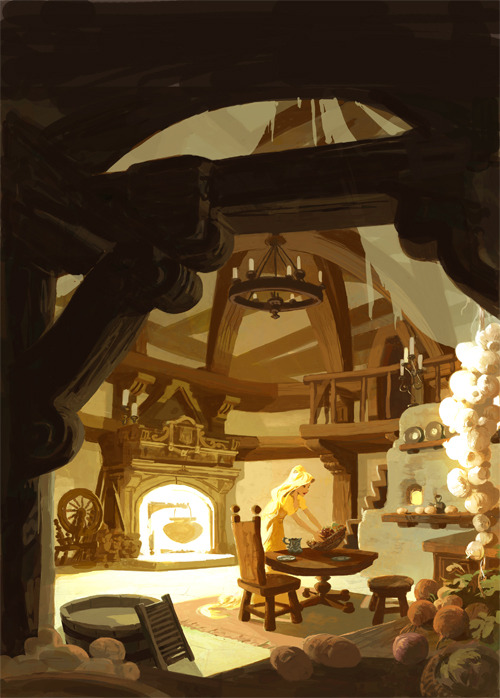
Because, they said, if the environment is too much like a prison, and Gothel is too much like a villainess, the audience wouldn’t believe in Rapunzel as a character. They’d think she was either stupid or cowardly, to stay in such a nasty situation without trying to escape sooner. But if her circumstances seem just livable enough, just sweet enough, that you can see some of the appeal, then you wouldn’t blame her for waiting so long to leave.
Why didn’t they do that with Wish?
Why didn’t they think that relatability through?
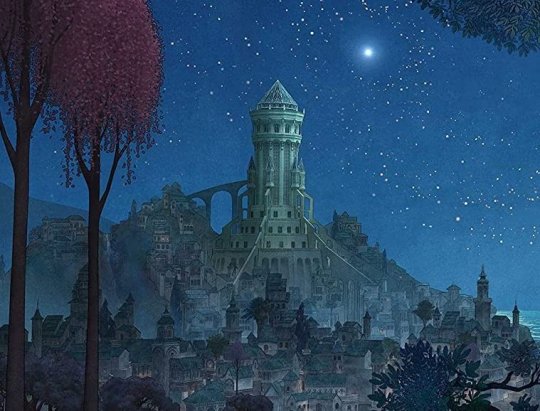
Nobody is really feeling compelled to root for the everyday Rosas citizens during the movie. You don’t feel like rooting for Asha’s cause, or even Queen Amaya’s. Because you think to yourself, “why did it take the townspeople so long to ask the question ‘why can’t we just have our wishes back?’”
Asha comes up with those culture-breaking questions, inexplicably, in the first twenty minutes of the movie. It takes the rest of the townspeople about 24 hours to suddenly start asking that, too.
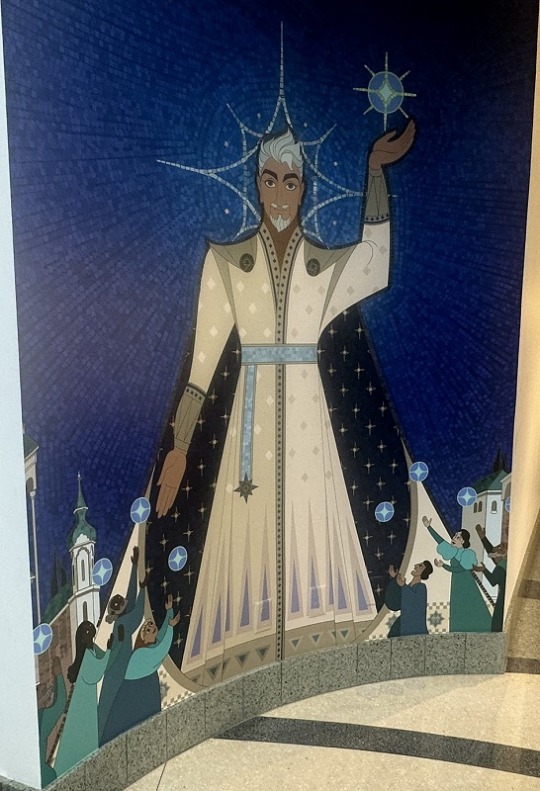
So why don’t you root for them?
Because when something bad happens to them, part of your brain goes, “why didn’t they see that coming, though? Why didn’t they ask questions? That one’s a little bit on them.”
And you don’t really feel that feeling you got with Mother Gothel, where you were like, “Oh yeah, I can see why the main character trusted this villain; the villain really seems to care about the hero, if you didn’t know what she was after.” You don’t;t get that same feeling with Magnifico. Because the whole idea of what he does—by erasing people’s memories and yelling at them and having no moments with regular folk where he’s warm and personal and building trust—is so malicious that we don’t believe the other characters couldn’t see it.
We COULD HAVE believed it. If they’d added in good writing and character moments to make it believable.
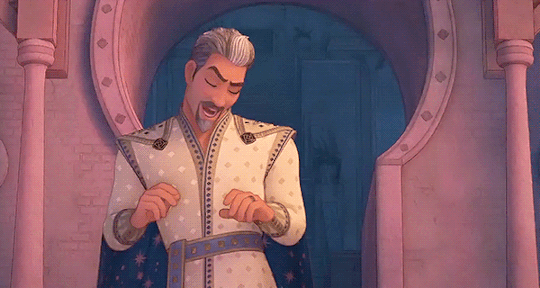
When Magnifico interacts with the people who trust him and are duped by him, he’s up on a stage, flashing superpowers they don’t have and then disappearing back into his tower after only granting one wish. He’s not on the welcome tour with Asha. He doesn’t know his own palace staff by name. He’s done nothing to build the trust all the side-characters unquestioningly give him. So even at the end, when everyone’s like, “aw, we wanted to believe in Magnifico,” we don’t feel it. Because didja? Why? Everyone could see that coming.
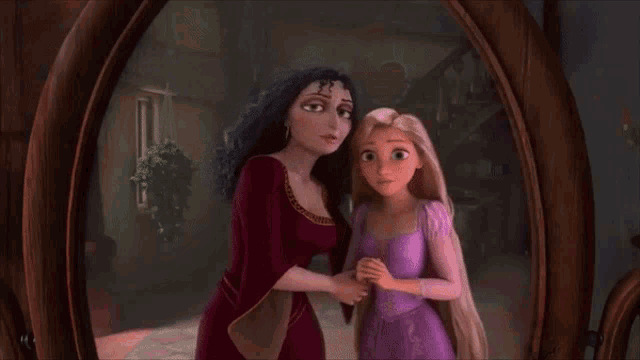
Meanwhile Mother Gothel tells Rapunzel she loves her most every time she leaves. She laughs with her. She reinforces every conversation they have with the idea that she’s desperate to protect Rapunzel. She brings her her favorite soup as a surprise and remembers the ingredients. She goes to get white paint on a very long trip so Rapunzel can paint. She compliments her strength and beauty—even if it’s backhanded. She calls her “dear,” and “darling.” She knocks thugs out with sticks, returning even after she argued with and supposedly ‘gave up’ on Rapunzel, all to supposedly’ protect’ her. So when Rapunzel realizes it was all an act, and she’s wrathful and furious and grabs Gothel’s hand, we DO feel it. Because we believed that Rapunzel really didn’t see this coming, so the shock stings worse. We don’t blame Rapunzel, and we do blame Gothel.
Just another example of what #NotMyDisney forgot about themselves.
#Tangled#wish#Gothel#mother Gothel#rapunzel#asha#Magnifico#wish hate#meta#conceit Art#criticism#analysis#character development#writing tips#character analysis#animation#Disney#NotMyDisney
551 notes
·
View notes
Text
She doesn't have sex with him to repay him for the ring. It’s because she feels something for him in that moment, she can tell he sees and accepts her (Anora, not Ani), and it freaks her out. So she tries to assume control by having sex, keeping him at a distance and making him into just another guy who only wants her for her body. But he disproves that by not actually participating in the sex and then trying to kiss her. That shattering of her worldview, combined with the stress she just went through, finally makes her defenses crumble. Note that she jumps him after the line about his grandma's car, not after he gives her the ring
- one reddit user’s interpretation
#anora#anora movie#mikey madison#anora film#film#movie review#movies#film analysis#movie thoughts#anora x igor#anora mikheeva#character analysis#character development#film discussion
121 notes
·
View notes
Text
A classic marriage "mistake" has been done by the perfect Twilight.
Yor has been so insecure of "the usefullness" of herself for a loooonnggg time
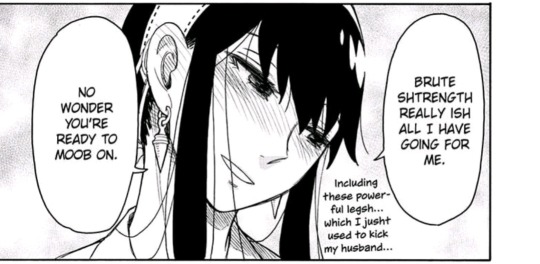
Twilight has to boost her confidence from time to time. Via words of affirmations.
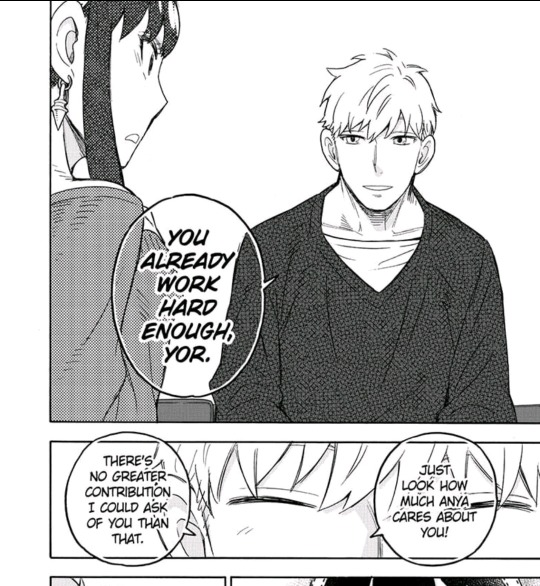
That is good.
However, the ever capable Twilight also does everything by himself

Of course he does all of this with good intentions. He doesn't want Yor to be tired. He wants to give her the best of everything.
And that is the mistake.
When one does everything by oneself, it will make the other person feels that they are uneeded. Being a couple especially so.
So that's why this is a major growth, that Twilight finally finally asking for Yor's help.
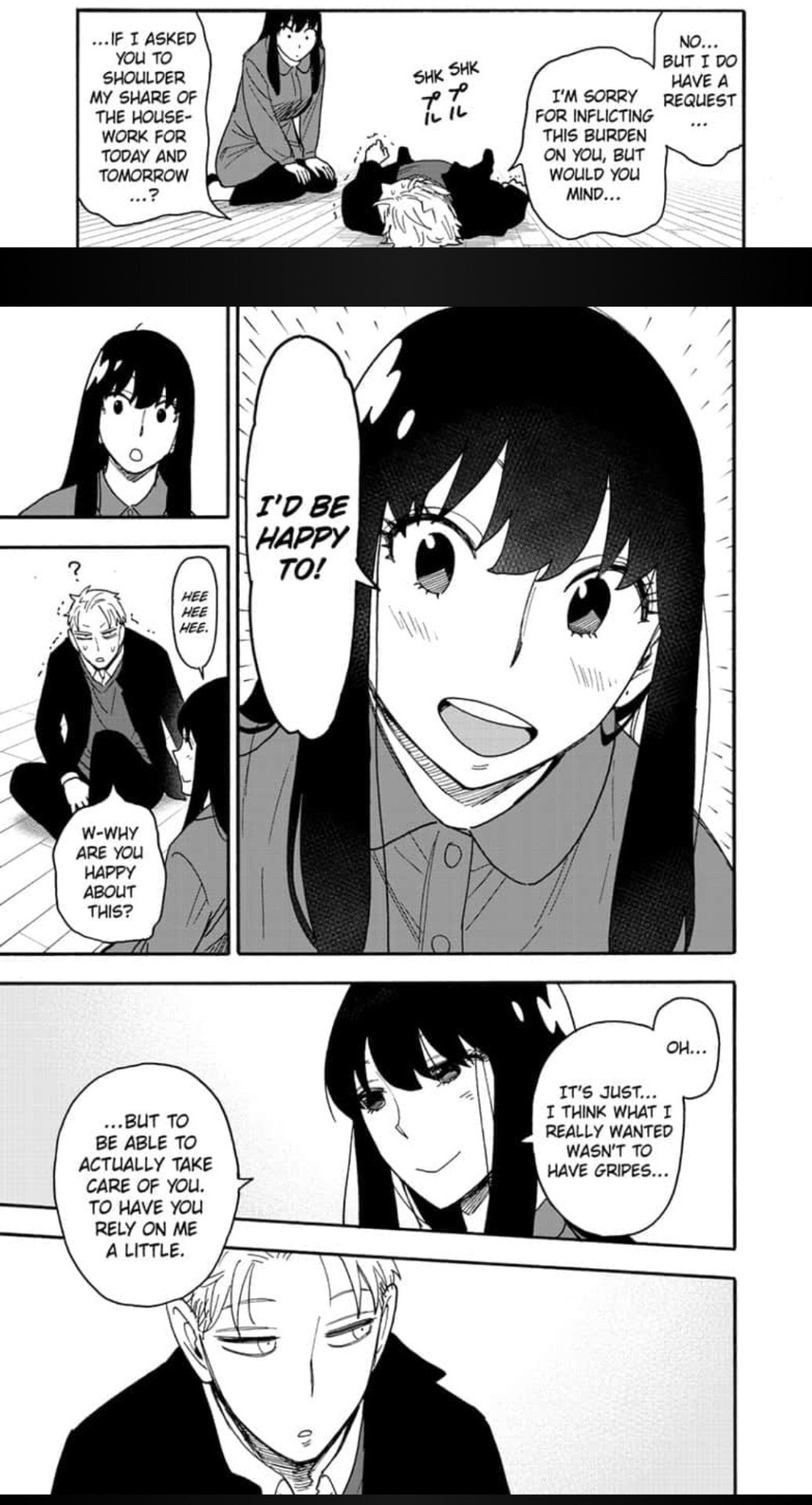
And that's makes her happy. Because she is now needed.
Being vulnerable in front of your spoused IS a good thing, Twilight.
I hope now you realize that 🥰🥰
#spy x family#yor forger#loid forger#twiyor#sxf meta#sxf analysis#sxf character analysis#sxf character development#sxf manga spoiler#sxf manga spoilers#chp 86
1K notes
·
View notes
Text

It's a cool character moment for Luffy that he immediately goes back to being chill after Marguerite is out of danger. I do think it's important thematically that Luffy first unleashed his Conqueror's Haki to help someone else rather than in service of himself, but it shows great maturity on Luffy's part that he's able to set aside that intensity and anger once he thinks that the Boa sisters are willing to bargain. Despite what they said a few panels ago, in his eyes this has always been a duel to be settled amongst themselves.
185 notes
·
View notes